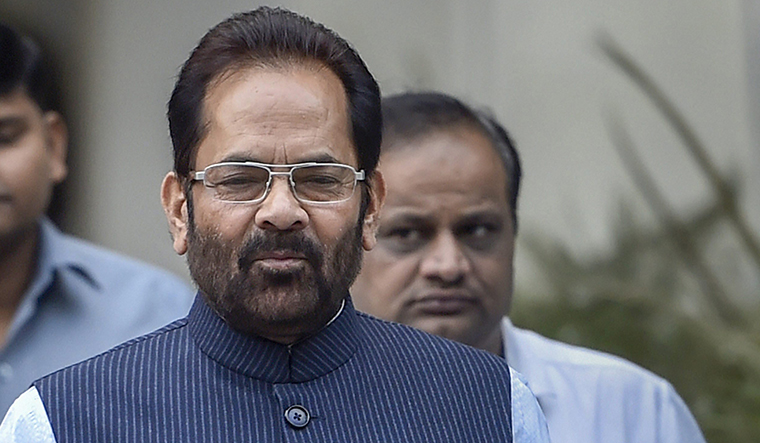Union Minister for Minority Affairs Mukhtar Abbas Naqvi on Wednesday claimed that the Narendra Modi dispensation, through the Citizenship Amendment Act, was only taking forward a policy guideline established in 1961 with regard to protection of non-Muslim communities in Pakistan (including East Pakistan, which is now Bangladesh) and Afghanistan.
He was addressing the National Commission for Minorities in Delhi on the occasion of Minorities Rights Day.
He said that the mandate of what was then the Social Justice Ministry, which was later transferred to a separate ministry dedicated to the welfare and protection of the rights of the minority communities, was the protection and preservation of non-Muslims in the neighbouring countries even as it strived to protect the rights of minorities in India.
“This decision was taken in 1961, when Modiji was not in power. The Congress had a majority...It is another matter that the Congress never took the initiative to fulfil this mandate. And in the meantime, the minorities in Pakistan suffered, they were persecuted and killed. While the number of minorities in Pakistan fell from 24 per cent in 1947 to two per cent, that in India has risen from eight per cent to 19-20 per cent,” Naqvi said.
“India is a heaven for minority communities, whereas Pakistan has proved to be hell for minorities,” he said, explaining the need for enacting CAA.
Naqvi strongly criticised the political opponents of the ruling dispensation for allegedly conspiring to create an atmosphere of fear and myth with regard to the Citizenship Amendment Act and the proposed nationwide National Register of Citizens.
In an apparent attack on the opposition parties, Naqvi said, "Forces with a dangerous mindset are trying to create an atmosphere of myth and fear. They are trying to create communal divisions in the country."
Stressing that a myth was being spread that India's Muslims were facing the threat of losing their citizenship, Naqvi said, “CAA merely clears the road for giving Indian citizenship to the minorities in Pakistan, Afghanistan and Bangladesh – Parsis, Jains, Christains, Buddhists, Hindus and Sikhs – who are being persecuted and killed.”
On concerns being raised about the NRC, he said that so far it has been carried out only in Assam, and as and when it will be undertaken in the rest of the country, people can choose from a long list of documents to prove their citizenship, including passport, rent receipt, birth certificate, proof of permanent residence, educational certificates, voter IDs etc.
Citing the example of Assam, he said that for those who were left out of the first NRC list, over 400 tribunals have been set up to decide on their citizenship, and the government is providing them with lawyers. “It is wrong to interpret the NRC as a process that will push out Muslims from the country,” he said.
“Muslims have lived in the country for generations. There is no threat to their citizenship and their rights are protected,” he said.
“Minorities are not like birds sitting on branches that you shake a branch and they will fly away,” the minister further said.
Naqvi, however, was critical of the police action on students at Jamia Millia University, and said an inquiry will be conducted to fix accountability for it.
“What the police did was wrong. They should not have entered places such as the women's hostel. The violence by the protesters was also wrong. We do not treat students as anti-nationals or anarchists. They are being misled,” he said.



